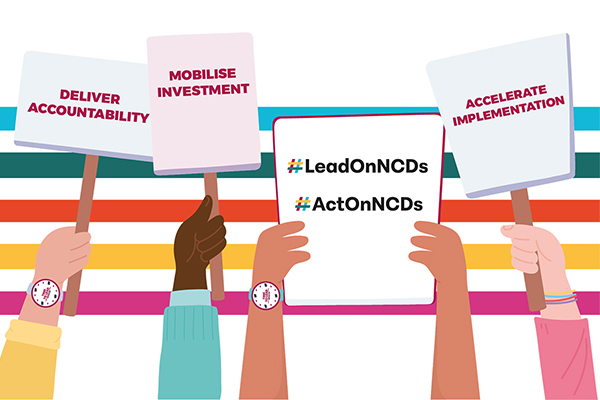Fingers are pointing at governments worldwide to take action on noncommunicable diseases (NCDs) thanks to The Call to Lead, an advocacy tool developed by NCD Alliance (NCDA) open to civil society endorsement.
The tool is a sign-on letter that direct governments to take three actions on NCDs for the 4th United Nations High-Level Meeting on NCDs (UNHLM) in September 2025:
- Mobilise investment;
- Accelerate implementation;
- Deliver accountability.
“Leaders have a moral imperative to urgently address the global epidemic of noncommunicable diseases,” said NCDA Policy Director Alison Cox. “NCDs are not just a health crisis—they threaten our collective future, deepen inequalities, and hinder sustainable development. Now is the time to turn commitments into actions that will protect millions and build a healthier, more equitable world where no one is left behind."
We represent the voices of billions of people living with NCDs, their families, and their caregivers, says the letter, which to date has been signed by more than 290 individuals and organisations.
We urge governments to fulfil their responsibility to protect current and future generations from the risk factors that cause NCDs and provide healthcare for those who need it. We assert the right of civil society, especially people living with NCDs, to be actively engaged in all relevant health processes and decision‑making.
The Call to Lead notes that governments have pledged for decades to take action on NCDs, but have actually done little. In target 3.4 of the SDGs, all UN Member States committed to a one-third reduction in premature deaths from NCDs and the promotion of mental health and wellbeing by 2030. However, implementation is progressing at a glacial pace, leaving the world far off track from achieving this target.
NCDs, including mental health and neurological conditions, are responsible for 41 million deaths every year, representing 3 in every 4 deaths worldwide. Yet, how to make progress on NCDs is clear according to the World Health Organization: address their risk factors. Scaling up spending on 16 NCD ‘best buy’ interventions in low- and lower-middle-income countries would return by 2030 at least US$7 in increased employment, productivity, and longer life, for every US$1 spent.
“The Call to Lead is a vital advocacy tool, amplifying the voices of those affected by NCDs and driving global action,” added Alison. “It empowers leaders to prioritise health, equality, and sustainable development for all.”
The Call to Lead directs governments at the UNHLM to:
- Mobilise investment by increasing sustainable funding for health. This includes specific and measurable financing targets for NCDs strategies and maximises the win-win from health taxes and other fiscal measures.
- Accelerate implementation by delivering the proven, cost-effective policies to reduce NCD risk factor exposure. This entails integrating quality NCD interventions into person-centred care and universal health coverage benefit packages, and expanding access to essential NCD medicines, technologies, and resources.
- Deliver accountability by regularly monitoring and reporting to citizens and the global community on an updated set of NCD targets extended to 2030 and beyond. NCD commitments must also be integrated into the post-SDG agenda.





